>> The Forecast for June 21st 2006
>> The Forecast for June 14th 2006
More...

Every week, Ninth Art's team of critics try to steer you to the best new comics on the shelves, and every year we look back over all the books that have passed through our hands to pick out the very best creators and titles of the past twelve months. Now we can reveal our winners and runners up of 2004. Welcome to the fourth annual Lighthouse Awards.
BEST PUBLISHER
Winner: DC
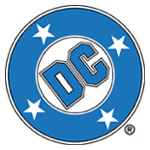 Marvel may have made a huge pot of money in 2004 thanks to licensed properties like Spider-Man, but in terms of publishing comics, the year belonged to the Distinguished Competition.
Marvel may have made a huge pot of money in 2004 thanks to licensed properties like Spider-Man, but in terms of publishing comics, the year belonged to the Distinguished Competition.
High profile books like BATMAN/SUPERMAN, TEEN TITANS, GREEN LANTERN: REBRITH and JLA CLASSIFIED set the charts on fire, and followed a simple but effective policy of coupling high profile creators with key characters in the DCU. The Vertigo and WildStorm imprints continued to be a hotbed of creativity with titles like FABLES, THE LOSERS, and EX MACHINA. Most successful, however, has been a little book called IDENTITY CRISIS. A superhero murder mystery by Brad Meltzer and Rags Morales, the violent story and undercurrents of misogyny left many readers cold, but the notoriety it generated and attendant media scrutiny ensured it was a hit.
Most of the credit for this year belongs to the continued stewardship of Dan DiDio, vice president and executive editor, who has worked hard at restructuring DC and making its titles accessible to new readers. The coming year should be just as interesting, with the recently announced All-Star Line of comics, another crossover event on the scale of DC's CRISIS, and, of course, a new Batman movie. The industry initiative has clearly been wrested from Marvel, but the question is, can DC continue to set the pace?
The Roll Of Honour:
Drawn & Quarterly: It's easy to overlook Drawn & Quarterly. According to its latest newsletter, D&Q released only eight comics in 2004. But that's because the publisher is all about quality over quantity - its books still picked up five Harvey Awards. With a roster of artists that includes Jason Lutes, Chris Ware, Chester Brown, Julie Doucet, James Sturm and Joe Sacco, D&Q has among the most consistently high standards in the business. Drawn & Quarterly's output may be modest in volume, but it's hugely important.
Image: Between publishing the likes of Paul Grist's entire oeuvre, the good portions of Robert Kirkman's work, Colleen Doran's A DISTANT SOIL and the great HAWAIIAN DICK, and continuing to support books like the bursting-at-the-seams NEGATIVE BURN anthology and the criminally-underrated REX MUNDI, Image is producing some of the most diverse work in the industry, all while offering it's creators the best deals. While much of the rest of the industry continues to ape the old 'Image style', Image itself is reaching for innovation.
Tokyopop: TokyoPop has risen to great prominence in the past couple of years, drawing in new readers left and right by translating and publishing comics from Japan and Korea. Even better, it does so with a wide variety of books, from the whodunnit mysteries of THE KINDIACHI CASE FILES and suspense thriller of BATTLE ROYALE, to the homoerotic police drama FAKE and the wistful love story of SUKI. Tokyopop doesn't just publish a lot of books, it publishes a diverse range of really good books.
BREAKTHROUGH TALENT
Winner: Dustin Nguyen
 Dustin Nguyen had worked at WildStorm since 2000, with a short run on THE AUTHORITY, and a JET miniseries with Dan Abnett, but he exploded onto comic consciousness with his gorgeous run on WILDCATS 3.0 with Joe Casey. The book was the critics' darling, and far more influential than its sales might have indicated. Everything worked, from the breathtaking covers Nguyen designed with Rian Hughes, to the teamwork with inker Richard Friend and colourist Randy Mayor. DC/WildStorm realised they were on to a rising star, and immediately collared Nguyen into a one year exclusive, a BATMAN series with Judd Winick, and the latest attempt to reanimate the corpse of THE AUTHORITY, this time with Ed Brubaker.
Dustin Nguyen had worked at WildStorm since 2000, with a short run on THE AUTHORITY, and a JET miniseries with Dan Abnett, but he exploded onto comic consciousness with his gorgeous run on WILDCATS 3.0 with Joe Casey. The book was the critics' darling, and far more influential than its sales might have indicated. Everything worked, from the breathtaking covers Nguyen designed with Rian Hughes, to the teamwork with inker Richard Friend and colourist Randy Mayor. DC/WildStorm realised they were on to a rising star, and immediately collared Nguyen into a one year exclusive, a BATMAN series with Judd Winick, and the latest attempt to reanimate the corpse of THE AUTHORITY, this time with Ed Brubaker.
Nguyen combines a lot of the best qualities of WildStorm's old stable of artists - the realism and sublime design sense of Travis Charest, the sheer joy of large-scale superheroics seen in the work of Jim Lee, and a tiny bit of Whilce Portacio's expressiveness. Yet all this combines into a style that is completely unique to Nguyen, and feels utterly modern. When the time comes round for DC to renew his exclusive, here's hoping they hand him one of the major franchises. He'll bat it out of the park.
The Roll Of Honour:
Pascal Ferry: Pascal Ferry has given sci-fi a needed kick in the pants with his hip pulp art in DC'S ADAM STRANGE. His character designs and landscapes are alien, beautiful, menacing and retro. Never has a man with a rocket pack, ray guns and a fin on his head looked so cool. It's enough to give us Buck Rogers flashbacks.
Juanjo Guarnido: In his stories of BLACKSAD, the black cat detective in a world of anthropomorphic animal crooks and schmoes, Guarnido's background in animation comes through only too clearly - but these are no Disney adventures. Humanity in all its sordid splendour runs deeper in Guarnido's beastly men and women than in most other artists' works, and thanks to IBooks' publication of the first two volumes of BLACKSAD in English, the Spanish artist's reputation is deservedly growing in the Anglophone world.
Robert Kirkman: Who would have guessed a blaspheming, gun-toting pontiff would kickstart a career at the hallowed halls of Marvel? From the self-published debut of BATTLE POPE in 2000, through creator-owned hits like INVINCIBLE and THE WALKING DEAD, Robert Kirkman has become one of the most prolific new writers in comics. Plying his trade of sci-fi and superhero adventure with a determination, discipline and drive matched only by his talent, Kirkman's "overnight success" in 2004's mainstream market was anything but, finally gaining him the profile he deserves.
OUTSTANDING ACHIEVEMENT
Winner: Dave Sim
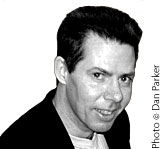 In recent years, Dave Sim's polarising views on politics, gender and religion have often overshadowed his achievements, both with CEREBUS itself and in the wider field of comics theory and publishing. But Sim has never been a stranger to controversy or accusations of madness. Whether he was announcing his intent to spend the majority of his adult life creating a 300-issue biopic concerning a talking aardvark, helping galvanise the creator's rights movement of the 1980s, or reprinting past issues of CEREBUS in affordable, perennially available collected editions, the comics industry heckled from the sidelines and mocked the strange, crazy Canadian.
In recent years, Dave Sim's polarising views on politics, gender and religion have often overshadowed his achievements, both with CEREBUS itself and in the wider field of comics theory and publishing. But Sim has never been a stranger to controversy or accusations of madness. Whether he was announcing his intent to spend the majority of his adult life creating a 300-issue biopic concerning a talking aardvark, helping galvanise the creator's rights movement of the 1980s, or reprinting past issues of CEREBUS in affordable, perennially available collected editions, the comics industry heckled from the sidelines and mocked the strange, crazy Canadian.
But time has proved Sim right: the fight for creators' rights has gained enormous ground in the past twenty years, and still continues. Collected editions of comics are not only the norm, but regarded by many as the future of the medium. And twenty-seven years on, in the year that saw its fabled 300th issue, CEREBUS stands as a unique, towering achievement of comics literature.
The Roll Of Honour:
Charles Brownstein: "Freedom of speech" is a funny thing. A lot of people don't really believe in it at all. A lot more people take it for granted. Combined, they like to enact fun new laws to deal with the pressing public menace of words, pictures and (shudder) ideas. Besides, it's not like comics are a big deal, are they? As the executive director of the Comic Book Legal Defense Fund, Charles Brownstein does sterling work fending these people off. We should all be grateful to him.
Paul Gravett: In the last couple of years, Paul Gravett has snuck on to the British convention scene to give London one of the most interesting and high quality celebrations of comics the country has ever seen. Gravett has happily embraced manga, anime, minicomics, bande dessinee, and mainstream superhero books under one roof, and this September extended the Comica brand to a separate Manga week. He recently published MANGA: 60 YEARS OF JAPANESE COMICS, and he's hard at work on another book, charting the history of the graphic novel. Gravett loves comics - all comics - and it's fortunate for us that he does.
Brad Meltzer: The most villainous act in comics this year wasn't another insane planet-destroying scheme, or a traitor in the midst or another mentalist hostage scenario... it was a low-key act of sexual assault against a superhero's wife. Though it set much of fandom in uproar, IDENTITY CRISIS did what it set out to do. It got everybody talking. There weren't as many key-strokes expended on any other piece of work in comics this year, and it's a work that will remain in fandom's higher functions for years to come. Sometimes we forget, it's a creator's role to challenge as well as to entertain.
BEST NEW SERIES
Winner: WE 3
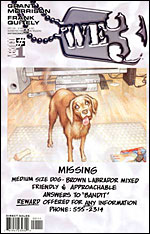 Though only two thirds complete as of this writing, Grant Morrison and Frank Quitely's piece de resistance of creative collaboration is already a hallmark for its handling of the sequential form. The narrative is a shockingly simple. It's the 'animals try to find their way home' plot with added military ordnance, genetic modification, and technology-driven emotional-extraction. But the majesty arises in the experimentation on display.
Though only two thirds complete as of this writing, Grant Morrison and Frank Quitely's piece de resistance of creative collaboration is already a hallmark for its handling of the sequential form. The narrative is a shockingly simple. It's the 'animals try to find their way home' plot with added military ordnance, genetic modification, and technology-driven emotional-extraction. But the majesty arises in the experimentation on display.
Many of Morrison's dalliances with formal experimentation have been wrapped in fourth-wall breaching meta-commentary, and his previous works with Quitely have been largely conventional. DC Vertigo's WE 3 is an artistic shot in the dark, and Quitely, when left to produce work at his own pace, clearly demonstrates what he's truly capable of, and what a trendsetter he could be.
WE 3 deserves to be counted as one of the greatest exercises in sequential experimentation of recent years. That it has so little competition makes its importance all the more evident.
The Roll Of Honour:
EX MACHINA: In the summer of 2004, with the US presidential election in full swing, Brian Vaughan announced that only those registered to vote would be allowed to buy the first issue of hus new book. As marketing ploys go, it was a good one, making it clear that here was a book that took politics seriously. So far we've had stories dealing with September 11, gay marriage, and power politicking worthy of early WEST WING, all with fabulous art from Tony Harris. EX MACHINA is sharply intelligent entertainment of a sort not often seen in this medium.
MY FAITH IN FRANKIE: A delightfully whimsical romantic comedy, touching on themes of faith, possessiveness, and unrequited love, MY FAITH IN FRANKIE is a singularly beautiful tale. DC may have made a misstep in collecting such a bright, colourful series as a dreary black and white paperback, but it's still arguably Mike Carey's finest hour to date, and it'll hopefully lead a lot more readers to discover the talents of MALINKY ROBOT creator Sonny Liew.
STREET ANGEL: STREET ANGEL sort of snuck up on us. It arrived without fanfare, yet everybody who picked up the first issue told everyone else they knew that they should buy it immediately. One of those odd titles that Slave Labor habitually and cannily takes under its wing, STREET ANGEL is chock-full of appealing quirk. The titular heroine is a homeless pre-teen skateboarder who fights pirates, ninjas and the devil. And just when you thought you had a handle on what was going on, the latest issue sucker-punched us all with a quiet, emotional, and meticulously illustrated little tale. Expect more surprises from this title in '05.
BEST CONTINUING SERIES
Winner: QUEEN & COUNTRY
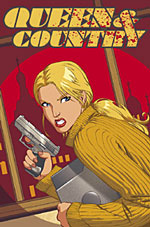 We love QUEEN & COUNTRY here at Ninth Art. In 2001, we voted it best new series. In 2002 and 2003, it made the roll of honour for this category. Now, as the book completes its fourth year, Greg Rucka's espionage thriller brushes aside the competition to take the award for best ongoing series. It's hard to believe that it started out as a spin-off from WHITEOUT.
We love QUEEN & COUNTRY here at Ninth Art. In 2001, we voted it best new series. In 2002 and 2003, it made the roll of honour for this category. Now, as the book completes its fourth year, Greg Rucka's espionage thriller brushes aside the competition to take the award for best ongoing series. It's hard to believe that it started out as a spin-off from WHITEOUT.
The range of visual styles provided by the rotating artists has proved a consistent boon where it could have been an inconsistency. Tara Chase continues to hold the book together as a thoroughly convincing lead character, despite an increasingly heavy turnover of supporting characters. And the book is still the best showcase for Greg Rucka's storytelling talent. Yes, it's a genre book, but it's an incredibly good genre book, and more than deserving of the award.
The Roll Of Honour:
THE LOSERS: THE LOSERS is a canny action thriller, combining a classic action adventure setup with dense, modern storytelling. Diggle's tight plotting, combined with Jock's energetic, eye-catching art and inventively designed covers, carry the reader on an issue-to-issue barrel ride, returning a sense of breathless abandon to DC's Vertigo imprint after far too long.
SLEEPER: A truly tense and exciting book, SLEEPER has continued into its second volume with just as much verve and thrills as its previous run. Ed Brubaker has scripted a wonderful story that captures all the frantic essence of the great espionage tales, and Sean Phillips' art complements it perfectly. This series deserves to run and run, and it's to be hoped that it gets the chance to do so in 2005.
SUPREME POWER: By placing postmodern interpretations of the JLA in the context of a dark political thriller, J Michael Straczynski and Gary Frank have created a story that slowly enfolds the reader like the creepy chill of a winter's eve. It's the moral ambiguity that makes this series so compelling - the actions of characters like Hyperion and Nighthawk alternate between nobility and horror - and the book's refusal to present itself in strict terms of black and white is mature and continually refreshing.
BEST BOOKSHELF COMIC
Winner: THE FILTH
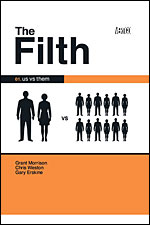 Following enthusiastic self-abuser Greg Feely on a journey from corner shop to quantum singularity, asking questions of love, identity and self-determination, THE FILTH crosses boundaries of space, time, gender, and great good taste to tell the story of a sleeper agent and his perfect love for a poorly cat.
Following enthusiastic self-abuser Greg Feely on a journey from corner shop to quantum singularity, asking questions of love, identity and self-determination, THE FILTH crosses boundaries of space, time, gender, and great good taste to tell the story of a sleeper agent and his perfect love for a poorly cat.
THE FILTH is a transitional work, lying smack in-between Grant Morrison's mandlebrot opus, THE INVISIBLES, and warmer, emotionally richer works like SEAGUY and WE 3. It's full of the usual things that get Morrison hot under the collar: treatises on the fractal nature of reality, sexy clothes, crazy ideas about poo, the relationship between the creator and the created, and lots of fighting.
It's almost a reactionary work, in some respects: Greg Feely constantly rejects the extraordinary in favour of the mundane. It's a story perfectly suited to Chris Weston's hyperrealist art, which throws up grumpy cybernautical mammals one minute, and Gilbert & George-inspired staff meetings the next.
THE FILTH is an expertly designed and self-contained piece of part-pervy loveliness, and probably the most perfect introduction into the World Of Grant Morrison.
The Roll Of Honour:
HOW LOATHSOME: Four interwoven stories about just the kind of people that Red State voters are terrified of, HOW LOATHSOME is a VILE BODIES for the modern age, perfectly capturing the spirit of youthful decadence and desperation in the 21st century as its characters strut and stagger through the San Francisco nights. The sophisticated, honest writing from Ted Naifeh and Tristan Crane brings HOW LOATHSOME's characters to stunning life, and it's perfectly matched by the raffish elegance of Naifeh's black, white, and sepia art.
McSweeney's Quarterly Concern #13: Principally edited by Chris Ware, this was one of 2004's best efforts at bringing comics to a wider audience. It's a classy primer on comics history and the current state of high-end indie work, combining excerpts from works by everyone from Crumb to Kaz with essays from John Updike, Michael Chabon, and others, and it grabbed the attention of mainstream book reviewers who'll give time to anything carrying Dave Eggers' McSweeney's brand.
THE COMPLETE PEANUTS: When he was 27 years old, Charles M Schulz drew a strange round-faced boy, who appeared to have no hair, and possessed an air of melancholy. Nearly fifty years later, Schulz retired from drawing PEANUTS, and died just before the final strip was published. Fantagraphics is now publishing the entire PEANUTS run, from the rare strips from the 50s right through to 1999. It's a massive undertaking, but this is one of comics' truly great works, and Fantagraphics is giving it the treatment it deserves.
BEST DEBUT
Winner: Jim Rugg and Brian Maruca's STREET ANGEL
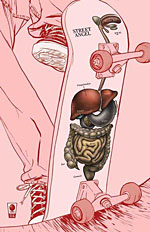 STREET ANGEL is an indie black and white book that's as exciting and enjoyable as anything on the stands. Newcomers Jim Rugg and Brian Maruca have created a tale that, in the wrong hands, would seem goofy and whimsical. In their hands, it's still goofy and whimsical, but in the best possible way, executed with charm and verve. The humour is satisfyingly wry, the action suitably muscular, the covers are just beautiful, and the story, pitting our skateboarding hero against a slew of crazy adversaries, is a riot.
STREET ANGEL is an indie black and white book that's as exciting and enjoyable as anything on the stands. Newcomers Jim Rugg and Brian Maruca have created a tale that, in the wrong hands, would seem goofy and whimsical. In their hands, it's still goofy and whimsical, but in the best possible way, executed with charm and verve. The humour is satisfyingly wry, the action suitably muscular, the covers are just beautiful, and the story, pitting our skateboarding hero against a slew of crazy adversaries, is a riot.
The success of this series so far lies in how effortless it seems to the reader; the 'goofy high-jinks' niche is a particularly difficult one to fill without appearing to try too hard, but STREET ANGEL doesn't force it at all. The art is similar, in that it's expressive without being over-detailed. If Rugg and Maruca can appear this accomplished on their debut, one can only wonder at what they might go on to achieve.
The Roll Of Honour:
FLIGHT: There was a definite buzz about this book even before it came out. It promised work from many young artists, mostly web-based, who'd been building up serious reputations, and the prospect of seeing them in print was delicious. Did the reality disappoint? Not in the least. This is a beautiful package with beautiful contents. Flight is the central theme, but every creator puts their own spin on it, giving us sky-scapes, escapes, travel, kites, rockets, and all sorts of wonders. Raw young talent from webcomics and animation had their first major print exposure in this book, and they shone.
Dan James' THE OCTOPI & THE OCEAN: Resembling a children's book for only the most disturbed of children, THE OCTOPI & THE OCEAN is an extraordinary debut, as freshly eccentric as Gary Larson at his best, told in striking and inventive style. What starts as a peculiar fable soon gives way to a silent story told with a sea of blue ink, in which a young man is abducted by octopi so that he can save them from evil sharks. Twisted. Ridiculous. Brilliant.
Andy Runton's OWLY: Andy Runton does the impossible: he makes cranky, bitter, grouchy people suddenly happy. Runton's debut book, OWLY, is a wordless story of an owl and his friend Wormy and their adventures together. OWLY is that rare creation that truly is for all ages, able to speak to you no matter how old or young you are. It's cleverly written, beautifully drawn, and has a real sense of morality and intelligence behind it. With a second volume due in 2005, clearly Top Shelf agrees.
TALENT DESERVING OF WIDER RECOGNITION
Winner: Becky Cloonan
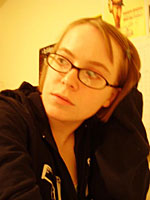 Becky Cloonan came to the attention of the near-mainstream with her work on Brian Wood's CHANNEL ZERO: JENNIE ONE in 2003. In 2004, people intrigued by the raw, punky lines of Cloonan's art got a near monthly dose with DEMO, again working with Wood.
Becky Cloonan came to the attention of the near-mainstream with her work on Brian Wood's CHANNEL ZERO: JENNIE ONE in 2003. In 2004, people intrigued by the raw, punky lines of Cloonan's art got a near monthly dose with DEMO, again working with Wood.
Possessed of a rare gift, Cloonan changed her art style for each issue, but it was still recognisably her own. Sometimes she gave us a bit of manga ('What You Wish For', issue #6's eerie horror story, and #11's slice-of-life, 'Midnight To Six'), others she left to stark masses of shadow (issue #7's war story, 'One Shot, Don't Miss'), or silent storytelling where the details were all in the art (the second issue, 'Emmy'). Cloonan's work was some of the most varied and creative all year, well deserving of wider recognition. We hope this year she gets the acclaim she deserves.
The Roll Of Honour:
Ross Campbell: Prior to 2004, Ross Campbell's lavish art was known mainly only to the role-playing community, but that changed with the release of SPOOKED from Oni Press, a horror story that proved a perfect showcase for Campbell's talents. His pencils are sumptuous and his inks are pools of darkness. Plus, there's not another artist on the planet so gifted at drawing braided hair. And that's the least of the accolades he should expect to receive in 2005.
Tristan Crane: Many comic creators have to grow up in public, honing their craft in minicomics and anthologies. Not Tristan Crane. His first foray into the comic medium was the brilliantly HOW LOATHSOME with Ted Naifeh, and following up such a strong debut is likely to be daunting. Crane is currently working on a manga-style teen series and more stories in the HOW LOATHSOME mould. Hopefully he can find the proper outlet for his sharp, candid wit.
Bryan O'Malley: Bryan O'Malley's LOST AT SEA was a beautiful, contemplative story about road trips and friendships. His new series, SCOTT PILGRIM, is even better. A wild rollercoaster ride of young love, evil ex-boyfriends, rock and roll battles, and warp tunnels, it's irresistibly entertaining. O'Malley's characters are some of the funniest in comics, both quotable and realistic-sounding, a rare combination. Hopefully O'Malley will keep us entertained with their exploits for years to come.
THE LIGHTHOUSE AWARDS 2004
Best Publisher: DC
Roll Of Honour: Drawn & Quarterly, Image, Tokyopop
Breakthrough Talent: Dustin Nguyen
Roll Of Honour: Pascal Ferry, Juanjo Guarnido, Robert Kirkman
Lighthouse Awards 2001
Lighthouse Awards 2002
Lighthouse Awards 2003
Outstanding Achievement: Dave Sim
Roll Of Honour: Charles Brownstein, Paul Gravett, Brad Meltzer
Best New Series: WE 3, by Grant Morrison and Frank Quitely (DC Vertigo)
Roll Of Honour: EX MACHINA, by Brian Vaughan and Tony Harris (Image), MY FAITH IN FRANKIE, by Mike Carey and Sonny Liew (DC Vertigo), STREET ANGEL, by Jim Rugg and Brian Maruca (Slave Labor Graphics)
Best Continuing Series: QUEEN & COUNTRY, by Greg Rucka, Mike Hawthorne, Steve Rolston and Mike Norton (Oni Press)
Roll Of Honour: THE LOSERS, by Andy Diggle and Jock (DC Vertigo), SLEEPER, by Ed Brubaker and Sean Phillips (DC WildStorm), SUPREME POWER, by J Michael Straczynski and Gary Frank (Marvel Max)
Best Bookshelf Comic: THE FILTH, by Grant Morrison and Chris Weston (DC Vertigo)
Roll Of Honour: HOW LOATHSOME, by Ted Naifeh and Tristan Crane (NBM), McSweeney's Quarterly Concern #13, edited by Chris Ware (McSweeney's), THE COMPLETE PEANUTS, by Charles Schulz (Fantagraphics)
Best Debut: STREET ANGEL, by Jim Rugg and Brian Maruca (Slave Labor Graphics)
Roll Of Honour: FLIGHT, by various (Image), THE OCTOPI AND THE OCEAN, by Dan James (Top Shelf), OWLY, by Andy Runton (Top Shelf)
Talent Deserving Of Wider Recognition: Becky Cloonan
Roll Of Honour: Ross Campbell, Tristan Crane, Bryan O'Malley
With thanks to Andrea Burgess, Greg McElhatton, John Mazzeo and Paul O'Brien.

This article is Ideological Freeware. The author grants permission for its reproduction and redistribution by private individuals on condition that the author and source of the article are clearly shown, no charge is made, and the whole article is reproduced intact, including this notice.


